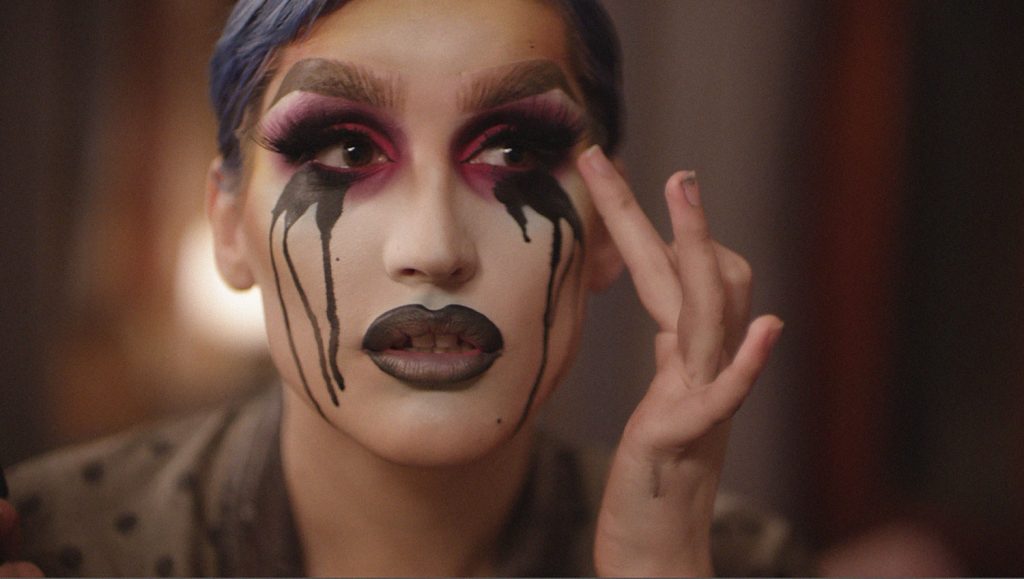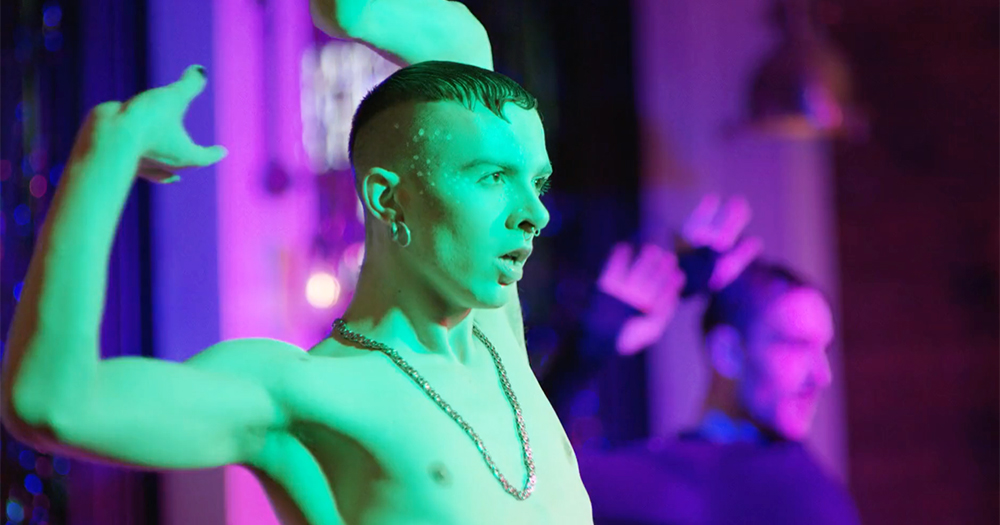Manchester natives Dennis Keighron-Foster and Amy Watson started the journey of crafting the punchy, political, sexy film Deep In Vogue with a simple intention: to write a love letter to the nightlife that had given them so much. But their intention evolved into so much more, and they have crafted a political piece that uses music, dance and raw talent to tell a story of oppression begetting a space of ultimate creativity.
Deep In Vogue is a personal project for the two co-filmmakers. “My friend about four or five years ago said to me, ‘Oh my god, I have found your spiritual home, you have to come to this’,” Dennis tells GCN, “I felt, as a queer person, like there was no place that fully represents me on the regular gay scene. And I went and it was so encouraging…there’s no place like it.”
Amy added similar sentiments: “As someone who’s always been a little bit of an outsider, I feel at home there. Everything about it speaks to me, and I love seeing people be their best selves. I’ve always been a part of queer nightlife because its where I felt most comfortable.”
Deep in Vogue follows Manchester Vogue houses and their mothers as they build-up to the Manchester ICONS Vogue Ball, and documents people creating confidence, authenticity, and inspiration in self-expression.
Dennis explains, “Houses are structures that are headed up by a house mother. They’re for people who cannot get regular dance jobs because they’re black, because they’re slightly overweight. It gives people this platform, this place where people can be accepted.”
“That has always been the ethos of the Manchester Vogue ball – whatever you are, whatever you’ve got to show, whatever you need to work out or explain on a stage about yourself, you’re welcome to” adds Amy.
As for the energy of a Manchester Vogue ball, it seems words can be insufficient in describing what it feels like. “Electric, completely electric,” Dennis describes it as, “whether its people who are Vogue ball veterans or first-timers, there’s this kind of electric feeling that can’t be denied.”
Amy adds “I think we felt and saw something at Vogue balls that we weren’t viewing or seeing anywhere else in our lives or in the culture around us. It’s kind of always coming from the person you least expect…the quietest person backstage becomes the biggest presence on stage…it’s like halfway between church, therapy, and a rave. It’s all these human spiritual needs converging in one place. I think part of the compulsion to make it was nobody knew this was happening in their town…even people in queer nightlife.”
Deep in Vogue educates viewers on how Manchester Voguing can be placed into the context of the legendary history of Vogue. “It was something at first that made us really nervous…there’s a weight to history, this compulsion to make sure we’re documenting it right because it means so much for people. POC, American, historical, Vogue houses are not voices that we even want to try to attempt [to speak for] because it’s not our place to…but we knew that Manchester did slot into this wider story,” adds Amy.
“Our film is structured a bit like a Manchester Vogue ball because they always start the ball by harking back to the inception of Vogue and saying ‘we need you to empathise…we need you to imagine you’re a young gay black teenager in 1980’s Harlem.’ Acknowledging this history was really important to us without trying to say ‘this is Vogue, this is raw, this is the ( sic) realest Vogue you’ll see,’ it’s not, it’s how Manchester Vogue is.”
Through the process of filmmaking, Amy and Dennis began to find that it was no coincidence that Vogue was enjoying a resurgence in Manchester. Amy shares, “The people taking part in it- there were specific needs being fulfilled.
“We saw that, post-Brexit, homophobic hate crimes are on the rise, that racist hate crimes are on the rise, and the people hardest hit by austerity were young black women. Looking at the news stories around us…gay couples are getting beaten up on the tram regularly…I just don’t remember that happening six, seven, eight years ago. Homophobia has always been there but now it feels like its getting worse.
“As a response to austerity, a more conservative government, a growing far-right presence on the internet, you realise that we need Vogue now more than ever.”
The film is also thought-provoking in its musings on the commercialisation and commodification of queer culture.
Dennis shares “I noticed there wasn’t a place for someone who was slightly feminine, someone who doesn’t fit the cis-gendered, heteronormative place where you seem to have to be to be on the regular gay scene now.” He notes this feeling overflows into how body positivity is exemplified in the Manchester Vogue scene: “There’s these sort of gross images that we get on fashion magazines that teach young people that being skinny is the absolute only way. [Vogue] captures the idea that people can strut their stuff in heels and not be stick thin.”
Dennis adds how it celebrates trans bodies, “Grace, who is the mother of the House of Decay, she’s trans, and she uses her trans body as a canvas for empowerment, and shows that you can be sexy and comfortable in your own skin, and that feeling is infectious.”

Amy asserts these are spaces where sexuality, and specifically female sexuality, can be expressed without fear. “As a young woman…you’re pretty much sexualised everywhere you go. Having a space where you can express yourself and you know it’s not going to rebound negatively or dangerously is really important. I’ve been naked on a runway…and no one called me a slut or thought it meant I’m up for it.”
The music also adds to the sexiness of the film. On those choices, Dennis said, “Of course, we used some original Vogue tracks… The music is punchy, sexy, visceral, that you can do new-wave Vogue to. For the other music in the film we used a Manchester band called Crazy P. As soon as we started putting the imagery to their tracks, it just really worked.”
“It taught me about social conditioning,” Dennis shared about the scene. “I think even I as a queer guy, I had still been socially conditioned to think feminising yourself is not good. It has allowed me to explore myself and my own social constraints, and kind of smash them up to bits.”
‘Deep in Vogue’ will open the GAZE Film Festival on Thursday, August 1. Amy and Dennis will be bringing their dancers who will perform before the film.
For more information and to get tickets, visit www.gaze.ie.
Also taking place as part of the festival, ACT UP Dublin and GCN will host a panel on HIV activism.
Entitled ACT UP Ireland: United And Angrier Than Ever, the panel will discuss the past, present and future of HIV/AIDS activism preceded by a selection of relevant short films. Tickets are available here.
© 2019 GCN (Gay Community News). All rights reserved.
Support GCN
GCN is a free, vital resource for Ireland’s LGBTQ+ community since 1988.
GCN is a trading name of National LGBT Federation CLG, a registered charity - Charity Number: 20034580.
GCN relies on the generous support of the community and allies to sustain the crucial work that we do. Producing GCN is costly, and, in an industry which has been hugely impacted by rising costs, we need your support to help sustain and grow this vital resource.
Supporting GCN for as little as €1.99 per month will help us continue our work as Ireland’s free, independent LGBTQ+ media.
